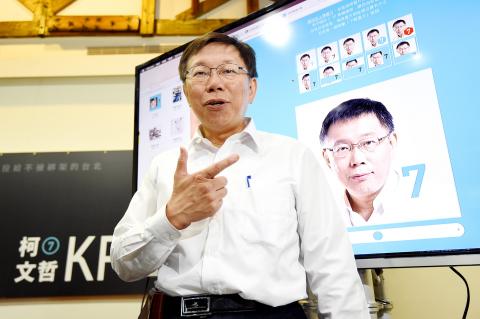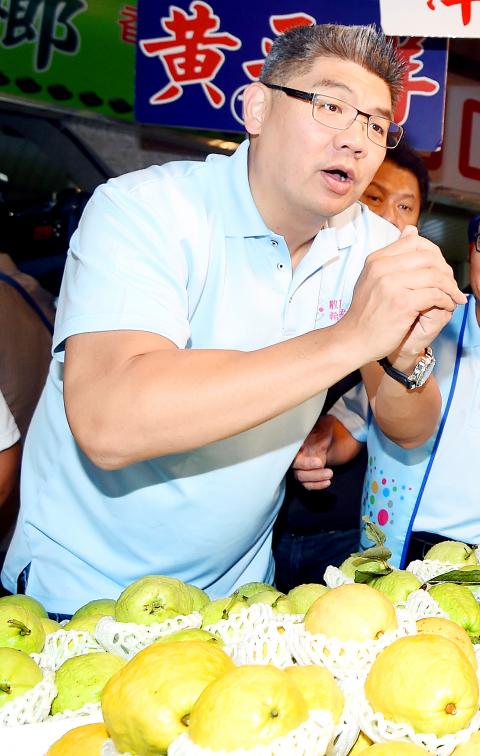A victory by independent candidate Ko Wen-je (柯文哲) in the Taipei mayoral election would hamper cross-strait relations and restrict the role that the city plays on the international stage because of his “denial” of the “1992 consensus,” Chinese Nationalist Party (KMT) spokesman Charles Chen (陳以信) said yesterday.
Chen made the remarks one day after China’s Taiwan Affairs Office (TAO) Minister Zhang Zhijun (張志軍) said that he hoped “everyone” would recognize the “1992 consensus” in response to questions about Ko.
The “1992 consensus,” a term that former Mainland Affairs Council chairman Su Chi (蘇起) admitted to making up in 2000, is an alleged agreement reached by Taipei and Beijing that there is “one China, with each side having its own interpretation.”

Photo: George Tsorng, Taipei Times
Whether Beijing accepts the idea has always been viewed with suspicion in Taiwan, since it has never recognized the existence of the Republic of China.
Many Taiwanese dispute that such a consensus was reached.
According to a Central News Agency (CNA) report from Beijing on Tuesday, Zhang commented on the elections on Saturday.

Photo: Chu Pei-hsiung, Taipei Times
The TAO has been closely watching election developments and looks forward to the results on Saturday night, Zhang said, according to the CNA report.
Zhang said whatever the outcome may be, he was optimistic about the future of cross-strait relations because both sides aspire for peaceful development.
According to the report, Zhang appeared to refrain from commenting directly about Ko when he was asked about prospects of interaction between Ko and China if he is elected, saying that Shanghai and Taipei have maintained good relations and cooperation, and that the question can only be answered after the elections.
Zhang was then asked whether China hoped Ko would recognize the “1992 consensus,” and Zhang replied that the “1992 consensus” is the basis of cross-strait relations and that he hoped that it could be accepted by everyone to ensure cross-strait relations would continue to move forward.
When asked to respond to Zhang’s comments on Tuesday, Ko told reporters that his main concern was “what is the content of the ‘1992 consensus?’”
Ko said he was opposed to putting people in a pigeonhole by asking them whether they like something or not without telling them what it is.
“At least at this moment, the Republic of China is my bottom line,” Ko said.
Although there is no need to involve cross-strait issues in the election, Ko said he would always air his views on matters of public interest.
Ko said he was confident about his understanding of China and the Chinese because he has visited the country 18 times.
“China is poised to become the word’s largest economy and geographically, it close to Taiwan. Whether Taiwan likes it or not, China is [a country] Taiwan needs to engage with,” he said.
Ko said he supports continuous cross-strait exchanges and signing the trade in services and goods agreement, but is also concerned about the lack of transparency in such negotiations and worries that these cross-strait exchanges are only benefiting the privileged few, rather than the general public.
If he is elected, Ko said the city government will continue to hold the Taipei-Shanghai City Forum, an annual event first held in 2010, with the same “frequency and depth” to observe “policy continuity.”
When it comes to further engagement, Ko said his policy would be guided by four principles: that both sides would “understand each other better, be charitable to each other, respect each other and cooperate with each other.”
Meanwhile, Chen issued a press release saying that the independent candidate’s denial of the existence of the “1992 consensus” would have “grave consequences” for Taipei if he were elected mayor.
“Just imagine how a Taipei mayor who refuses to accept the ‘1992 consensus’ can develop cross-strait city exchanges. How can this mayor continue to advance exchanges between Taipei and Shanghai under the Taipei-Shanghai City Forum? How can he elevate the relationship between Taipei and Hong Kong?” Chen said.
As the 2016 World Design Capital, Taipei is to stage a series of design-related events that year and the following year, it is to host the World University Games, Chen said.
“Could Ko’s rejection of the ‘1992 consensus’ result in a boycott of these events by mainland China?” Chen said.
The TAO issued a statement later on Tuesday evening saying that China never makes comments about candidates running in Taiwanese elections, while reiterating the importance of the “1992 consensus” as the basis for cross-strait relations.
At a press conference yesterday morning, TAO spokesperson Ma Xiaoguang (馬曉光) said that the core element of the consensus reached by the Straits Exchange Foundation and China’s Association for Relations Across the Taiwan Strait following their meeting in Hong Kong in 1992 is that “each side of the [Taiwan] Strait expresses verbally its insistence on the ‘one China’ principle.”

NATIONAL SECURITY THREAT: An official said that Guan Guan’s comments had gone beyond the threshold of free speech, as she advocated for the destruction of the ROC China-born media influencer Guan Guan’s (關關) residency permit has been revoked for repeatedly posting pro-China content that threatens national security, the National Immigration Agency said yesterday. Guan Guan has said many controversial things in her videos posted to Douyin (抖音), including “the red flag will soon be painted all over Taiwan” and “Taiwan is an inseparable part of China,” while expressing hope for expedited “reunification.” The agency received multiple reports alleging that Guan Guan had advocated for armed reunification last year. After investigating, the agency last month issued a notice requiring her to appear and account for her actions. Guan Guan appeared as required,

Japan and the Philippines yesterday signed a defense pact that would allow the tax-free provision of ammunition, fuel, food and other necessities when their forces stage joint training to boost deterrence against China’s growing aggression in the region and to bolster their preparation for natural disasters. Japan has faced increasing political, trade and security tensions with China, which was angered by Japanese Prime Minister Sanae Takaichi’s remark that a Chinese attack on Taiwan would be a survival-threatening situation for Japan, triggering a military response. Japan and the Philippines have also had separate territorial conflicts with Beijing in the East and South China

A strong cold air mass is expected to arrive tonight, bringing a change in weather and a drop in temperature, the Central Weather Administration (CWA) said. The coldest time would be early on Thursday morning, with temperatures in some areas dipping as low as 8°C, it said. Daytime highs yesterday were 22°C to 24°C in northern and eastern Taiwan, and about 25°C to 28°C in the central and southern regions, it said. However, nighttime lows would dip to about 15°C to 16°C in central and northern Taiwan as well as the northeast, and 17°C to 19°C elsewhere, it said. Tropical Storm Nokaen, currently

PAPERS, PLEASE: The gang exploited the high value of the passports, selling them at inflated prices to Chinese buyers, who would treat them as ‘invisibility cloaks’ The Yilan District Court has handed four members of a syndicate prison terms ranging from one year and two months to two years and two months for their involvement in a scheme to purchase Taiwanese passports and resell them abroad at a massive markup. A Chinese human smuggling syndicate purchased Taiwanese passports through local criminal networks, exploiting the passports’ visa-free travel privileges to turn a profit of more than 20 times the original price, the court said. Such criminal organizations enable people to impersonate Taiwanese when entering and exiting Taiwan and other countries, undermining social order and the credibility of the nation’s